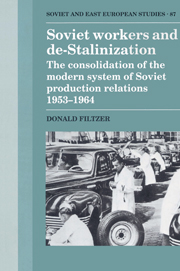 Soviet Workers and De-Stalinization
Soviet Workers and De-Stalinization Book contents
- Frontmatter
- Contents
- List of tables
- Preface and acknowledgements
- List of terms and abbreviations
- Introduction: the contradictions of-Stalinization
- Part I Labour policy under Khrushchev: issues and results
- Part II De-Stalinization and the Soviet labour process
- Conclusion
- Notes
- Bibliography
- Index of industrial, mining, and construction enterprises
- General index
- Soviet and East European Studies
Conclusion
Published online by Cambridge University Press: 29 January 2010
- Frontmatter
- Contents
- List of tables
- Preface and acknowledgements
- List of terms and abbreviations
- Introduction: the contradictions of-Stalinization
- Part I Labour policy under Khrushchev: issues and results
- Part II De-Stalinization and the Soviet labour process
- Conclusion
- Notes
- Bibliography
- Index of industrial, mining, and construction enterprises
- General index
- Soviet and East European Studies
Summary
De-Stalinization, civil society, and socialism
The main argument of this book has been that de-Stalinization was faced with one overriding task to which all others – no matter how great their historical ramifications – were subordinate, namely the need to increase the efficiency of surplus extraction. In part this was attempted through various roundabout methods which did not involve tampering with the essential structure of the system: in industry the reorganization of administration into sovnarkhozy; in agriculture, the opening up of virgin lands and the constant tampering with regulations governing private plots, state purchase prices for grain and other farm products, and ownership of agricultural machinery. None of these measures could obviate the need to address the more fundamental issue of how the surplus was produced within industry. This meant inevitably raising the rate of exploitation. Given the failure of Stalinist policies, when the elite had attempted to rule through sheer coercion, it was evident that the working class would have to accede to this process or it would be doomed to failure. Significant improvements in economic performance would, therefore, require sweeping political changes, for only then could the regime hope to re-establish some form of legitimacy in the eyes of the population. The terror would be removed, and other methods of motivating the workforce would have to be found. Insofar as the scope for political reform was limited by their destabilizing effect on the elite's hold on power, they would have to be supplemented by coercion – only now, economic coercion rather than the coercion of the labour camps.
Labour policy under Khrushchev reflected this abortive character of de-Stalinization.
- Type
- Chapter
- Information
- Soviet Workers and De-StalinizationThe Consolidation of the Modern System of Soviet Production Relations 1953–1964, pp. 231 - 240Publisher: Cambridge University PressPrint publication year: 1992
